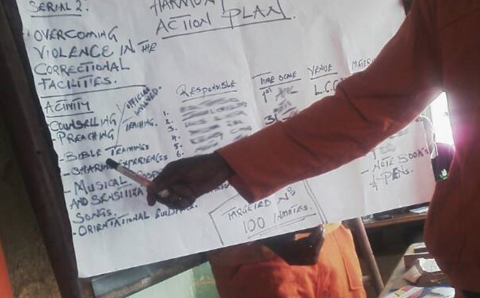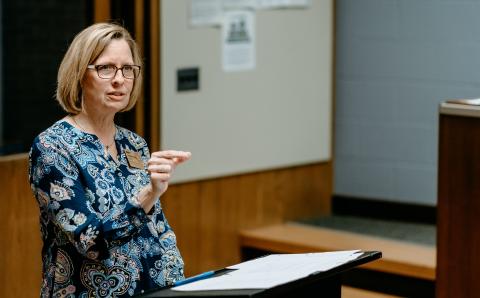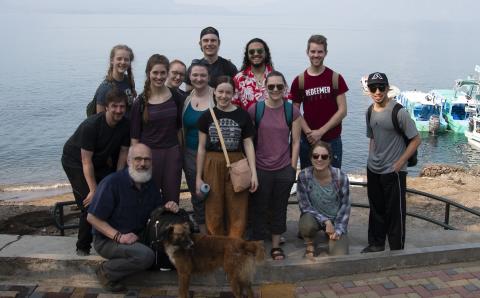Warning: The following doctrinal statement may ruin your next gaming experience. Read at your own risk.
According to the Christian Reformed Church of North America, “Pastors and church councils are urged to expose all destructive influences on people's lives that seek to trivialize or render irrelevant the providence of God. They must also caution against the impact of materialism, take decisive action to combat the evil of gambling, and minister compassionately to persons addicted to or victimized by lotteries.” (CRCNA website, 2019)
Destructive? Evil?
This is the official position of the church.
When you gamble—to whatever degree and via whatever form—you risk hurting yourself and others by trivializing or rendering irrelevant the providence of God.
This hardline position should be no surprise to a denomination that holds such a high view of God’s providence. If an all-powerful God is watching over us in such a way that not a hair can fall from our heads apart from his will—intimately and graciously attending to our every need—then any attempt to needlessly supplement his care should be suspect.
Why would a Christian need to win a lottery when they’ve already been given everything?
We tell ourselves that we’re not playing for the money, and this might be true for a friendly game of no-stakes poker, but lotteries are always about the money, aren’t they? Why else would you play? The truth is, even if we see a night at the casino as a $50 or $100 night of entertainment, what is really driving us is winning.
So if winning money is the true reason why we are gambling, then it might be wise to unpack our motivations.
What drives us to want more?
Is it greed (wanting more for more’s sake), envy (wanting more of what others have), sloth (wanting more but not wanting to work for it), or pride (wanting more in order to be more)?
Or maybe it’s a fear of not having enough, and the hope that a big win will enable you to finally retire in comfort.
Perhaps you’re just addicted to the adrenaline rush, real or imagined.
French philosopher Jean Baudrillard writes, “Consumerism is not kindled when needs for specific objects are created and consumed, but rather when the need to need, the desire to desire is manifested.” We live in a culture that constantly kindles our desire to desire. This makes it easier to justify a gambling habit. In a world where everyone wants to want all the time, endlessly feeding quarters into a slot machine makes sense.
For many, this habit can be addictive.
Theologian Lesslie Newbigin said, “Because man is so made that only God can satisfy him, his desires are unlimited.” What lotteries take advantage of is arguably the strongest force in human nature; our desire to engage the richness of God. Human beings are made to experience the adrenaline rush of knowing God’s infinite and eternal glory. This is what our insatiable desires are made for. Newbigin goes on to say, “When [man] tries to satisfy unlimited desires by means of natural goods, he ruins himself.”
Years ago (wisely or not) I preached a sermon on the topic of Seven Card Texas Hold’em. At the time, this card game was all the rage, and I wondered why. I came to the conclusion that it was trading on a God-given desire. Human beings are made for the exhilaration that can come from making an ‘all-in’ bet that yields an inestimable and unmerited prize. God made us for this risk/reward moment. And, in Christ, God graciously gives us all we need when we put our trust in him.
This is where we should be placing our bets. And when we don’t, we take an experience that is meant to play out before God, and spend it on something that can never be God. The lottery can never give the way God gives (on time, in just the right way, and personally).
So why ask it to? Why put your trust into its hands? Why take the risk?
If gambling is just entertainment, then it should be easy to walk away. But it isn’t, and doesn’t that tell us something?
God’s already given us a good means by which he can sustain us: work. And gambling is a bit of an affront to that gift. Like the proverb says, “Those who work their land will have abundant food, but those who chase fantasies will have their fill of poverty” (Prov. 28:19). In many ways, work regulates what we receive by keeping us from having too much. But when we circumvent work’s regulating influence, we risk having more than we can handle.
But what about all of the good causes that casinos and lotteries support? I have to admit that, of all the lottery ads that get pushed on me, these are the most tempting. Where I live, there is an annual lottery that offers free homes, cars, and cash, all for the very good cause of supporting a crucial air ambulance service. How can I not buy a ticket for this? There’s nothing like a good cause to move an ethical line. Yet I choose not to, and instead find another, more stewardly way to support the cause.
And if I’m spiritually awake, I’ll even turn that moment of temptation into a spiritual practice. Staring at the photo of that beautiful new home or car, I’ll recognize the desire I’m feeling and then say to God, “But you’re my home, and traveling with you, Lord, is more than I could ever want. All of my riches are in you, and I’m going to give all that I can, all that I am, to you!”
As I commit to that wager, the peace of Christ surrounds me, and I am reminded that the one who holds the cosmos together holds me and my family and our finances together.
God holds our future in his hands. Everything that exists and all that we possess is a gift and proof that God knows what we need, right down to the last detail.
If living a Christian life is all about becoming more like Jesus, then we should need what he needed, desire what he desired, and want what he wanted.
“What I’m trying to do here is get you to relax, not be so preoccupied with getting so you can respond to God’s giving,” Jesus says in the gospel of Luke. “People who don’t know God and the way he works fuss over these things, but you know both God and how he works. Steep yourself in God-reality, God-initiative, God-provisions. You’ll find all your everyday human concerns will be met. Don’t be afraid of missing out. You’re my dearest friends! The Father wants to give you the very kingdom itself” (Luke 12:29-32, The Message).








